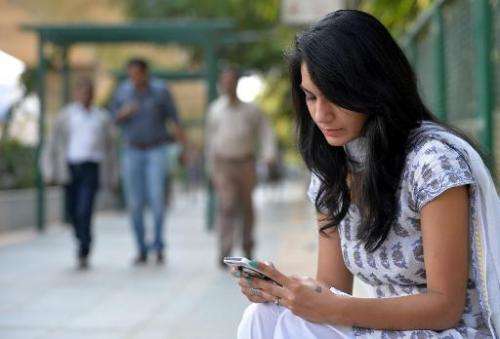The Pew Research Center survey showed a median of 64 percent of respondents in 32 emerging and developing nations say the Internet is a positive for education
People in emerging economies see the Internet as a good thing for education and the economy, but worry about its impact on morality, a global survey showed Thursday.
The Pew Research Center survey showed a median of 64 percent of respondents in 32 emerging and developing nations say the Internet is a positive for education.
A majority also see the Internet as a good influence on personal relationships and the economy, but offer a mixed view on other impacts, the Pew Global Attitudes survey showed.
Asked about the Internet's impact on politics, 36 percent said the Internet is good, but 30 percent said it was negative.
Meanwhile, 42 percent said the Web is a bad influence on morality, with 29 percent saying it is positive.
The survey highlights ambivalence toward the Internet in countries with varying numbers of people online—from just eight percent in Pakistan to 76 percent in Chile.
Pew researchers noted that Internet use is growing fast in these countries, largely due to increased use of smartphones accessing the mobile Web,
"Once online, Internet users in emerging and developing nations have embraced socializing as their most preferred type of digital activity," the report said.
Pew researchers noted that Internet use is growing fast in emerging economies countries, largely due to increased use of smartphones accessing the mobile Web
"Majorities of Internet users in all countries surveyed with large enough sample sizes to analyze say they stay in touch with friends and family online through social networking sites. Many also use cyberspace for getting information about politics, health care and government services."
The survey found people who have Internet access are generally more positive about its influence on society. And the more highly educated people also were more likely to see the Internet as beneficial.
Varying online access
Among the 32 countries surveyed, the median percentage of people online was 44 percent.
"Internet use is highest in the wealthiest of the emerging nations, particularly in Chile and Russia, where more than seven in 10 have Internet access," the report said, noting that these rates are still behind the US percentage of 87 percent.
"The lowest Internet rates are in some of the poorest countries surveyed. Just eight percent of Pakistanis and 11 percent of Bangladeshis either say they access the Internet at least occasionally or own a smartphone."
The survey found people who have Internet access are generally more positive about its influence on society. And the more highly educated people also were more likely to see the Internet as beneficial
Computers remain out of reach of most people in many of the countries surveyed. The percentage of people with access to a PC varied from 78 percent in Russia to three percent in Uganda, with a median of 38 percent.
An estimated 84 percent of people in these countries had access to some type of cell phone, but the percentage was just 24 percent for an Internet-capable smartphone, the survey found.
In only two of the countries surveyed did a majority own a smartphone—58 percent in Chile and 55 percent in China, in line with the 58 percent in the United States.
The percentage with smartphones was below 10 percent in Tanzania, Bangladesh, Uganda and Pakistan.
The report is based on 36,619 face-to-face interviews in 32 countries with adults from March 17 to June 5, 2014. The margin of error varied by country from 3.3 percent to 4.5 percent.
A separate report last month by Facebook's Internet.org initiative found that the Internet is used only by about 29.8 percent in developing nations.
© 2015 AFP

























